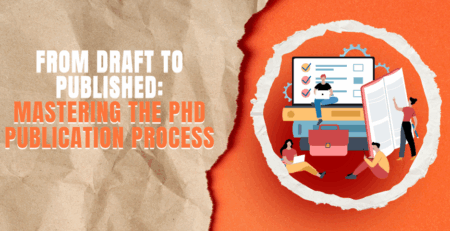Surviving the First Year of Your PhD: What to Expect
Kenfra Research - Shallo2025-05-17T16:36:13+05:30The first year of a PhD program is often described as a rollercoaster—full of excitement, discovery, and unexpected challenges. The First Year of Your PhD is a year of transition, where you shift from being a student to becoming a researcher. Whether you’re pursuing a PhD in science, engineering, social sciences, or humanities, the First Year of Your PhD sets the foundation for your entire doctoral journey. In this comprehensive guide, we’ll walk you through what to expect during your first year, how to survive common pitfalls, and how to thrive academically and mentally.

1. The Transition: From Coursework to Research
One of the biggest adjustments in the first year of a PhD is shifting your mindset from structured coursework to independent research. While some programs still include classes, the focus gradually tilts toward producing original knowledge.
What to Expect:
- More reading, less spoon-feeding – Expect to dive into research papers, journals, and textbooks to build your background.
- Independent learning – Professors may guide you, but you’re expected to take the initiative.
- Literature reviews – You’ll likely spend months understanding what has already been done in your field.
2. Building a Relationship With Your Supervisor
Your PhD supervisor (or advisor) plays a crucial role in your success. The first year is when you set the tone for this relationship.
What to Expect:
- Frequent meetings – In the beginning, you’ll need guidance on your research direction, expectations, and available resources.
- Mixed emotions – Supervisors vary: some are hands-on, others give you space. Understanding their style is key.
- Feedback may sting – Expect constructive criticism. It’s part of academic growth.
Tips for Survival:
- Be proactive. Don’t wait for your supervisor to check in.
- Set realistic timelines and communicate openly.
- Don’t take criticism personally—it’s aimed at improving your work.
3. The Impostor Syndrome: It’s Real
Most first-year PhD students experience impostor syndrome—the feeling that you’re not good enough or don’t belong. You’re not alone.
What to Expect:
- Comparison traps – You’ll meet peers who seem to know everything. Remember, everyone has a unique academic path.
- Self-doubt – Even top students question their abilities during this period.
- Perfectionism – The pressure to produce flawless work can be overwhelming.
Tips for Survival:
- Acknowledge the feeling without letting it control you.
- Join support groups or talk to senior PhD students.
- Celebrate small wins—finishing a tough paper, presenting a seminar, etc.
4. Time Management: Your Most Valuable Skill
Unlike structured degrees, a PhD demands strong time management skills. Without clear deadlines, it’s easy to lose direction.
What to Expect:
- Juggling multiple tasks – Reading, experiments, classes, teaching, and maybe even conference presentations.
- Unpredictable schedules – Research can be slow or unexpectedly time-consuming.
- Burnout risks – Poor time management leads to exhaustion and delays.
Tips for Survival:
- Use digital tools like Notion, Trello, or Google Calendar to plan.
- Set weekly and monthly goals.
- Learn to say no—don’t overload yourself with non-research commitments.
5. Building a Research Topic
In many programs, you don’t start with a fully-formed research topic. Instead, you spend your first year exploring ideas.
What to Expect:
- Literature deep-dives – You’ll read hundreds of papers to identify gaps.
- Discussions with your supervisor – These are crucial for refining your focus.
- Changing directions – Don’t panic if your original idea evolves—it’s normal.
Tips for Survival:
- Keep a research diary to track ideas and sources.
- Discuss early drafts of your proposal with peers or mentors.
- Attend seminars or webinars to stay updated in your field.
6. Coursework and Comprehensive Exams (if applicable)
Some universities require coursework or qualifying exams in the first year. These are designed to ensure you have a strong foundation.
What to Expect:
- Course overload – Balancing classes with research can be tough.
- Exam stress – Comprehensive or qualifying exams are mentally demanding.
- Evaluation pressure – Failing to meet coursework standards may delay your progress.
Tips for Survival:
- Prioritize understanding over memorization.
- Form study groups with peers.
- Consult with past students about exam formats and expectations.
7. Building Your Academic Profile
Even in the first year, you can start developing your research profile.
What to Expect:
- Conference opportunities – Presenting early research ideas boosts confidence.
- Research assistant roles – These can help fund your PhD and provide valuable experience.
- Publishing pressure – While not mandatory in year one, start thinking long-term.
Tips for Survival:
- Start drafting research ideas early.
- Look out for calls for papers or abstracts.
- Connect with researchers on platforms like ResearchGate, Google Scholar, and LinkedIn.
8. Work-Life Balance: Don’t Forget to Live
It’s easy to let your PhD consume you. But burnout is real, and the key to long-term success is balance.
What to Expect:
- Weekend workdays – Sometimes, research demands extra time.
- Isolation – Especially in solo fields or remote settings.
- Mental fatigue – You may feel drained even without physical work.
Tips for Survival:
- Schedule regular breaks and downtime.
- Engage in hobbies, exercise, and social activities.
- Seek support from friends, family, or counseling services.
Final Thoughts: You’re Not Alone
The First Year of Your PhD is challenging—but also deeply rewarding. It’s a time of exploration, personal growth, and intellectual discovery. Remember that it’s okay to feel lost or overwhelmed during the First Year of Your PhD; what matters is that you keep moving forward, step by step.
Kenfra Research understands the challenges faced by PhD scholars and offers tailored solutions to support your academic goals. From topic selection to advanced plagiarism checking.








Leave a Reply